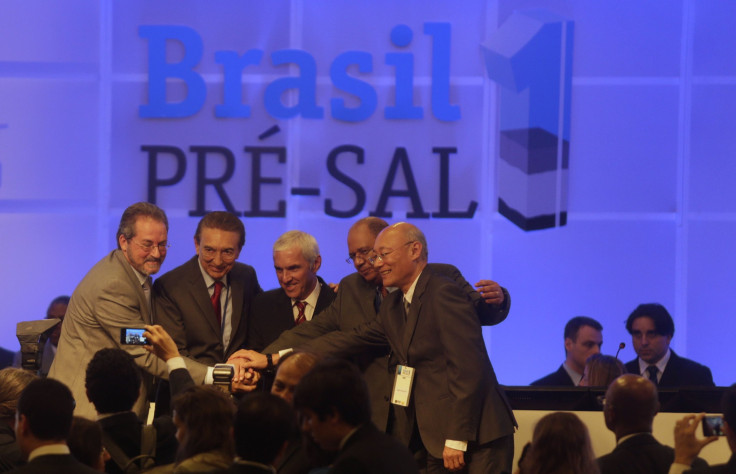Brazil Sells Giant Libra Oil Field Rights To Consortium Including Petrobras, Shell, Total, CNOOC And CNPC

The rights to explore Brazil's biggest oil field were auctioned off on Monday amid protests to a group of five companies, which was the sole bidder, as several foreign companies stayed away from the process discouraged by what was perceived to be excessive state control over oil exploration in South America's largest country.
The consortium, led by Brazil’s state-run Petroleo Brasileiro Petrobras SA (NYSE:PBR), included two private-sector firms, Netherlands-based Royal Dutch Shell plc (NYSE:RDS.A) and France-based Total SA (NYSE:TOT); and, China-owned CNOOC Limited (NYSE:CEO) and China National Petroleum Corporation, or CNPC. The oil discovery off Brazil’s southeast coast, is estimated to contain recoverable resources ranging between 8 billion barrels to 12 billion barrels of oil, according to Brazilian regulator ANP, and could generate $1 trillion in public revenues over 30 years.
“The Libra oil discovery in Brazil is one of the largest deep water oil accumulations in the world,” Shell CEO Peter Voser said, in a statement.
The companies won a combined contract to explore the Libra oil discovery, buried under a deep layer of salt, which itself lies below a deep layer of rock, in the Santos Basin, approximately 105 miles off the coast of Rio de Janeiro, and covers an area of 1,550 square kilometers.
Petrobras holds 40 percent of the stake as operator while Shell and Total hold 20 percent each, and CNPC and CNOOC hold 10 percent each. The group’s tender was to provide the state 41.95 percent of oil from Libra, the minimum threshold set by the government prior to the auction.
The exploration contract is expected to be signed in November and as part of the winning bid, Shell and Total will pay their 20 percent share of the total signing bonus of $1.4 billion each, while CNOOC and CNPC will pay $700 million each, the companies said in separate statements. The consortium is estimated to have to invest about $200 billion over 35 years to pump oil from the field.
More than $46 billion is expected to go into the development of Libra, and the Brazilian government is expected to receive $138.2 billion in royalties from selling the rights as well as another $276.5 billion worth of oil, ANP chief Magda Chambriard was quoted as saying by EFE news agency.
Chambriard called the auction an "absolute success" and added: "It is hard to imagine a more successful outcome. These companies are among the world's 10 most valuable in the energy branch," the BBC reported.
However, earlier on Monday, hundreds of demonstrators gathered near the auction venue, in the Barra da Tijuca district in Rio de Janeiro, protesting against the proceedings and alleging that the sale relinquished control over the country’s oil resources to foreign companies. Police intervened with tear gas and rubber bullets after peaceful protests escalated into clashes.
The government had earlier declared that revenues from oil resources would go to public education and health care, two of the vital concerns of the country's citizens, who had taken to the streets across the nation over the past few months demanding better public services from the government.
© Copyright IBTimes 2025. All rights reserved.






















